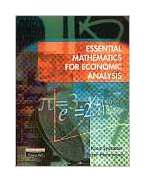|
||
• wydawnictwa polskie
• Zamów informacje o nowościach z wybranego tematu • kontakt
• Cookies na stronie |
ESSENTIAL MATHEMATICS FOR ECONOMIC ANALYSISSYDSEATER K.wydawnictwo: FT/PH , rok wydania 2002, wydanie Icena netto: ESSENTIAL MATHEMATICS FOR ECONOMIC ANALYSIS Essential Mathematics for Economic Analysis provides an invaluable introduction to mathematical analysis for economists and students from other social science backgrounds taking a general course in mathematics. The coverage is comprehensive, ranging from elementary algebra to more advanced material, whilst focusing on all the core topics usually taught in undergraduate courses on mathematics for economists. FEATURES
The book is primarily intended for undergraduate courses in Mathematics for Economists at first and second year level. Students are expected to have completed A-Level mathematics, or at least a preliminary course. However, there is considerable coverage of basic material in early revision or 'catch-up' chapters. The book is also appropriate for students of other social sciences who are taking a general mathematics course. Knut Sydsseter has been a Professor of Mathematics in the Economics Department at the University of Oslo since 1985, and has extensive experience in teaching mathematics for economists. In addition to his teaching at Oslo University (since 1965), he has given graduate courses in dynamic optimization at Yale, Berkeley, and Gothenborg. He has written and co-authored a number of books, of which several have been translated into many languages. . : Peter Hammond has been a Professor of Economics at Stanford University since 1979, and earlier held the same position at the University of Essex. He completed a BA in Mathematics and a PhD in Economics at Cambridge University. He has been an editor of the Review of Economic Studies, and of the Econometric Society Monograph Series, and is currently on the editorial boards of Social Choice and Welfare and of the Journal of Public Economic Theory. 687 pages Księgarnia nie działa. Nie odpowiadamy na pytania i nie realizujemy zamówien. Do odwolania !. |


